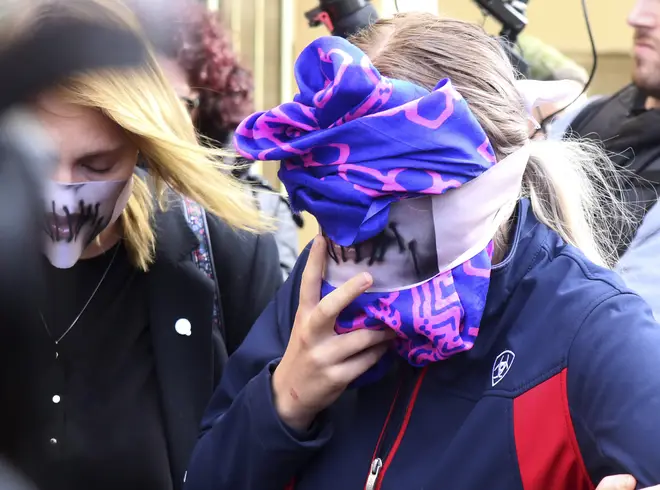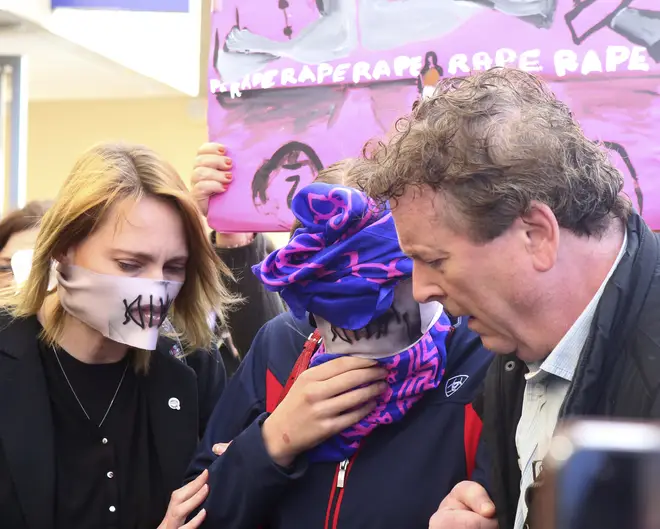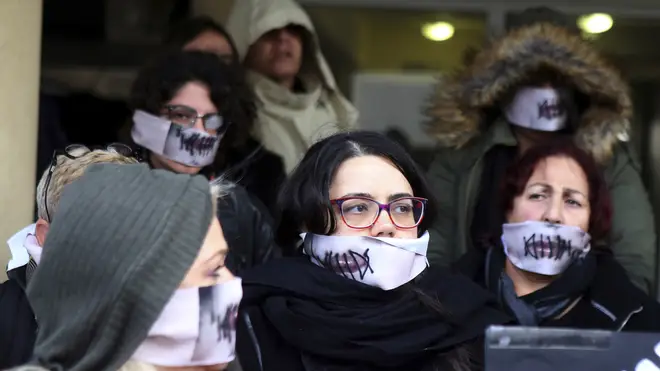
Ian Payne 4am - 7am
30 December 2019, 08:01

The Government will raise concerns with the Cypriot authorities over whether a British teenager found guilty of lying about being gang-raped had a fair trial.
The unnamed 19-year-old was today convicted of public mischief, and could be facing a year in prison.
She alleged 12 Israeli tourists assaulted her in a hotel room in Ayia Napa on July 17 and filmed the attack.
She then made a retraction statement 10 days later, but maintains that she only did so after being pressured by the local police.
But lawyers and campaigners have criticised the justice system after the judge refused to consider evidence of the alleged rape.
A forensic pathologist, who was brought in by the defence, also testified that the woman had suffered injuries that were consistent with a sexual attack.
After her arrest, the woman was imprisoned for four and a half weeks before being bailed on the condition that she did not leave the island.
The 12 Israelis arrested over the alleged attack were allowed to return home after they were released.
She was a week into a working holiday at the time of the attack, and had been due to start university when she returned to the UK.

She was convicted of a single count of public mischief at Famagusta District Court in Paralimni earlier today, and will be sentenced on 7 January 2020.
She is facing up to a year in prison and a fine of 1,700 euro (£1,500).
The teenager nodded her head slightly as she was found guilty but showed no other emotion.
During the trial, prosecutors claimed she willingly wrote and signed the statement of retraction.
However, the woman's lawyers claimed she was instructed what to write by Cypriot police, and she wrote and signed it over fears she would be kidnapped or killed.
Giving evidence, she said: "This is not in proper English. This is in Greek English.
"I'm very well educated. I'm going to university, I got an unconditional offer so there is no way I would write a paragraph like this.
"It doesn't make grammatical sense.
"All the way through there isn't one sentence an English person would write."

Passing sentence on the case, Judge Michalis Papathanasiou said: ""The defendant gave police a false rape claim, while having full knowledge that this was a lie.
"The reason why she initially gave false statements was because she realised that she was being recorded while she was having sexual intercourse and so she was placed in a difficult position and felt embarrassed.
"She then apologised saying she had made a mistake by filing a false statement."
He said the woman "did not make a good impression, she did not tell the truth, and tried to mislead the court" during her evidence.
"There was no rape, or violence, and police had carried out a thorough investigation making all necessary arrests," the judge added.
The teenager was mobbed by photographers and camera operators as she left court with her face covered alongside her mother.
Both were wearing white scarves around their faces depicting lips sewn together - brought by protesters from the Network Against Violence Against Women, who filled the court and demonstrated outside.
The teenager and her mother left the building as defence lawyer, Nicoletta Charalambidou, told reporters they plan to appeal against the verdict.
"The decision of the court is respected," she said.

"However, we respectfully disagree with it. We believe there have been many violations of the procedure and the rights of a fair trial of our client have been violated.
"We are planning to appeal the decision to the Supreme Court... and if justice fails we are planning to take our case to the European Court of Human Rights."
None of the Israelis gave evidence during the trial and the woman's legal team criticised the judge's refusal to consider evidence of the alleged rape.
Her lawyers said the video found on some of the Israelis' mobile phones showed her having consensual sex with one of the group while others try to enter the room as she tells them to leave.
Michael Polak, a lawyer from the Justice Abroad group, which is assisting the teenager, said: "Although the defence team is very disappointed with the decision of the court, having put a lot of effort into the lengthy trial process and after bringing expert evidence before the court, we are not surprised by the result given the frequent refusal during the trial of the judge to consider evidence which supported the fact that the teenager had been raped.
"Shutting down questioning from our Cypriot advocates and the production of evidence into the trial on a handful of occasions the judge stridently stated 'this is not a rape case, I will not consider whether she was raped or not'.
"We have found it incredibly difficult to follow this logic given that an essential element of the offence is for there to be a 'false statement concerning an imaginary offence' and therefore, clearly if the teenager was raped, she cannot be guilty."
Protester Argentoula Ioannou also criticised the verdict, adding: "We are here to show solidarity for the young lady who instead of being treated as a complainant for the rape that she suffered is here accused of public mischief.
"Unfortunately, we strongly believe that the rights of this young lady have been violated."
But Nir Yaslovitzh, a lawyer representing some of the Israelis arrested over the alleged rape, welcomed the verdict.
"I applaud the court's decision to convict the girl," he said.
"I hope the court will find it appropriate to aggravate the punishment imposed on the girl, who refuses to this day to take responsibility for the horrible act she's done against the boys."